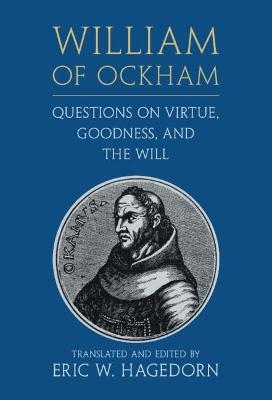
William of Ockham: Questions on Virtue, Goodness, and the Will
Cambridge University Press (Verlag)
978-1-108-49838-8 (ISBN)
William of Ockham (d. 1347) was among the most influential and the most notorious thinkers of the late Middle Ages. In the twenty-seven questions translated in this volume, most never before published in English, he considers a host of theological and philosophical issues, including the nature of virtue and vice, the relationship between the intellect and the will, the scope of human freedom, the possibility of God's creating a better world, the role of love and hatred in practical reasoning, whether God could command someone to do wrong, and more. In answering these questions, Ockham critically engages with the ethical thought of such predecessors as Aristotle, Augustine, Thomas Aquinas, and John Duns Scotus. Students and scholars of both philosophy and historical theology will appreciate the accessible translations and ample explanatory notes on the text.
Eric W. Hagedorn is Associate Professor of Philosophy at St. Norbert College, Wisconsin. He has published a number of articles and book reviews on medieval philosophy of mind, language, and logic in journals including Oxford Studies in Medieval Philosophy and Notre Dame Philosophical Reviews.
Acknowledgments; List of Abbreviations; Note on the Texts and Translation; Introduction; Bibliography; Part I. Questions about Created Wills: 1. Are Memory, Intellect, and Will Really Distinct Powers? (Rep. II, q. 20); 2. On Pleasure, Pain, and Distress (Var. Ques. q. 6, a. 9); 3. On Practical Activity, Ends, and Moral Knowledge (Ord., Prologue, qq. 10-12, excerpts); 4. On Love, Hate, and Final Causes (Var. Ques., q. 4, excerpts); 5. Should Everything Other Than God Only Be Used? (Ord., d. 1. q. 1); 6. Is Enjoyment an Act of the Will Alone? (Ord., d. 1, q. 2); 7. Does the Will Contingently and Freely Enjoy the Ultimate End? (Ord., d. 1, q. 6); 8. Does a Beatified Will Necessarily Enjoy God? (Rep. IV, q. 16); Part II. Questions about the Divine Will: 9. Could God Make a World Better than this World? (Ord., d. 44, q. un, excerpts); 10. Is God's Will the Immediate and First Cause of Everything that is Done? (Ord., d. 45, q. un); 11. Could the Divine Will be Impeded by any Creaturely Power? (Ord., d. 46, q. 1); 12. Could God Command that a Bad Thing Be Done? (Ord., d. 47, q. un); 13. Is Every Created Will Obligated to Conform Itself to the Divine Will? (Ord., d. 48, q. un.); Part III. Questions about Virtue and Moral Goodness: 14. Does a Virtuous Habit have the Intellective Part as its Subject? (Rep. III, q. 11); 15. Is Every Virtuous Habit Generated from Acts? (Rep. III, q. 12); 16. On Self-Control, Temperance, and Prudence (Var. Ques. q. 6, a. 10); 17. Could the Will have a Virtuous Act concerning an Object about which there is an Error in the Intellect? (Var. Ques., q. 8); 18. Is a Bad Angel Always Engaging in a Bad Act? (Rep. II, q. 15); 19. On the Nature of Mortal Sin (Rep. IV, qq. 10-11, excerpts); 20. On Acts that are Intrinsically and Necessarily Virtuous (Var. Ques. VII, a. 1, excerpts); 21. Is Only an Act of the Will Necessarily Virtuous? (Quod. III, q. 14); 22. Can there be Demonstrative Knowledge about Morals? (Quod. II, q. 14); Part IV. Questions about Charity, Merit, and Grace: 23. Is it Necessary to Posit Three Theological Virtues in This Life that Can Remain in the Next Life? (Rep. III, q. 9, excerpts); 24. Is it Necessary to Posit, in addition to the Holy Spirit, Absolute Created Charity Formally Informing the Soul? (Ord., d. 17, q. 1); 25. Could an Act of the Will be Meritorious without Charity Formally Informing the Soul? (Ord., d. 17, q. 2); 26. Does Every Meritorious Act Presuppose Created Charity? (Ord., d. 17, q. 3); 27. On the Infusion of Virtue and Grace and the Removal of Guilt in Baptism (Rep. IV, qq. 3-5); Index.
| Erscheinungsdatum | 28.04.2021 |
|---|---|
| Übersetzer | Eric W. Hagedorn |
| Zusatzinfo | Worked examples or Exercises |
| Verlagsort | Cambridge |
| Sprache | englisch |
| Maße | 230 x 150 mm |
| Gewicht | 680 g |
| Themenwelt | Geisteswissenschaften ► Philosophie ► Geschichte der Philosophie |
| Geisteswissenschaften ► Philosophie ► Philosophie des Mittelalters | |
| Geisteswissenschaften ► Philosophie ► Philosophie der Neuzeit | |
| Sozialwissenschaften | |
| ISBN-10 | 1-108-49838-8 / 1108498388 |
| ISBN-13 | 978-1-108-49838-8 / 9781108498388 |
| Zustand | Neuware |
| Informationen gemäß Produktsicherheitsverordnung (GPSR) | |
| Haben Sie eine Frage zum Produkt? |
aus dem Bereich


